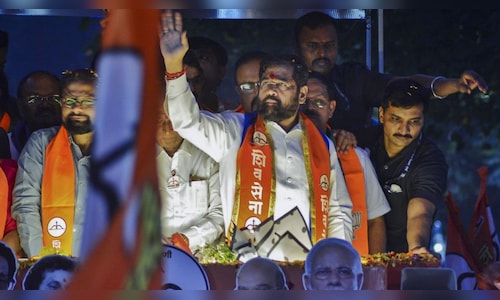
The ruling BJP-led Mahayuti alliance, comprising the BJP, Shiv Sena (Eknath Shinde faction), and the NCP (Ajit Pawar faction), is vying to retain power, while the opposition Maha Vikas Aghadi (MVA), an alliance of Congress, Shiv Sena (UBT), and the NCP (Sharad Pawar faction), is hoping for a strong comeback.
High-Profile Campaigning
The election witnessed a flurry of activity as political heavyweights like Prime Minister Narendra Modi, Amit Shah, Rahul Gandhi, and Priyanka Gandhi Vadra traversed the state, rallying support for their respective alliances.
The Mahayuti, comprising the BJP, Shiv Sena (Eknath Shinde faction), and NCP (Ajit Pawar faction), banked on flagship initiatives such as the Majhi Ladki Bahin scheme for women empowerment. However, the BJP’s use of slogans like “Batenge toh katenge” and “Ek hai toh safe hai” drew criticism from the MVA, accusing the ruling alliance of divisive tactics.
The MVA focused on issues of caste-based census, social justice, and protecting the Constitution, targeting voters they claim have been neglected under the ruling alliance.
Infighting and Controversy
The Mahayuti faced internal discord, with Deputy Chief Minister Ajit Pawar distancing himself from the BJP’s slogans. Attempts by Devendra Fadnavis to clarify their intent only added to the confusion within the ruling coalition.
The BJP launched a final ad blitz targeting the opposition, urging voters to “Say No to Congress”, referencing incidents like the 26/11 Mumbai attacks and the Palghar lynching.
Contesting Parties
The BJP is contesting 149 seats, Shiv Sena (Shinde faction) 81, and NCP (Ajit Pawar faction) 59. On the other hand, the Congress has fielded 101 candidates, Shiv Sena (UBT) 95, and NCP (Sharad Pawar faction) 86.
Smaller parties like the Bahujan Samaj Party (BSP) and the All India Majlis-e-Ittehad-ul-Muslimeen (AIMIM) are also in the fray, with the BSP contesting 237 seats and AIMIM 17 seats.
Voter Statistics
This election has seen a 28% increase in candidates, with 4,136 contenders, up from 3,239 in 2019. Among them, 2,086 are independents, and over 150 constituencies have rebel candidates challenging their party’s official nominees.
The number of registered voters has risen to 9.63 crore, an increase of 69.23 lakh since 2019. This includes 20.93 lakh first-time voters, aged 18-19, following focused enrolment drives. The electorate also includes 6.36 lakh voters with disabilities, 1.16 lakh armed forces voters, and 47,716 centenarians.
Polling Infrastructure
The number of polling booths has increased to 1,00,186, compared to 96,654 in 2019, to accommodate the rise in voter turnout. Around six lakh state government employees will be deployed for election duties to ensure smooth polling.
Voters in Thane district will have access to Assured Minimum Facilities (AMF) at polling booths on November 20, including basic amenities such as drinking water, ramps for differently-abled individuals, and adequate seating arrangements. Additionally, braille facilities have been established to assist visually impaired voters, ensuring an inclusive voting process, a poll official said.
To maintain law and order during polling, over 10,900 police personnel will be deployed across Thane district. This includes 4,161 home guards and 24 companies of the Central Armed Police Forces (CAPF) and State Armed Police Forces (SAPF), according to Thane district collector and election officer Ashok Shingare.
Additional security will be concentrated in sensitive constituencies such as Airoli, Ovla-Majiwada, and Bhiwandi East due to a history of heightened illicit activities. Central Industrial Security Force (CISF) personnel have been assigned to these areas, with their numbers likely to increase further.
Thane district comprises 18 assembly constituencies, including the prominent Kopri-Pachpakhadi seat, where Maharashtra Chief Minister Eknath Shinde is contesting.



